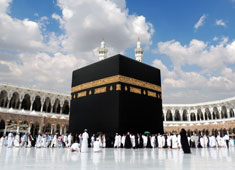Fatwas on Women's Hajj
Fatwas on Women's Hajj

- A iwoman ntended to do Hajj Tamattu‘ then she got her period before doing ‘Umrah; what should she do?
Question: I would like to know if a woman intends to perform Hajj Tamatt'u and leaves from her home and gets her monthly period and is not able to perform the Umrah first and the 8th of Dhul-Hijjah arrives. What should she do? will she still be able to perform Hajj Tamatt'u without performing Umrah first due to her periods? Will she have to change her Niyyah (intention)? Also I would like to know if you have women and old peoplel with you whom you have to look after, is it ok if you don't walk fast while performing Tawaf and between Al-Safa and Al-Marwa
Answer: If a woman enters Ihram for Umrah, then her period comes and she does not become pure from it before ‘Arafah, then she should intend to do Hajj, and thus it will become Qiraan, as happened to ‘Aa’ishah (may Allah be pleased with her). She was doing Hajj Tamattu‘, then her menses came after she entered ihram for ‘Umrah, and she was not able to do ‘Umrah before Hajj. So she joined Hajj to ‘Umrah, and it became Qiraan. Narrated by Al-Bukhaari (305) and Muslim (1211).
It says in Zaad al-Mustaqni‘: If a woman menstruates and she is afraid that she will miss Hajj, she should enter Ihram for Hajj, and it becomes Qiraan.
Shaykh Ibn ‘Uthaymeen (may Allah have mercy on him) said: What is meant by woman here is the woman who is doing Hajj tamattu‘, i.e., she entered Ihram for Umrah so that she could then take off Ihram, and perform Hajj in the same year, and she reached Mecca on the fifth day of Dhu’l-Hijjah and got her menses, and her period usually lasts six days, so she will become pure (taahir) on the eleventh, i.e., after the standing [in ‘Arafah] is over; hence she cannot perform Tawaf and Sa‘ay and end her Umrah.
We say to this woman: You have to enter Ihram for Hajj, so that you will be doing Qiraan, because the Prophet (blessings and peace of Allah be upon him) instructed ‘Aa’ishah to do that when her menses came in Sarif before she entered Makkah. The basic principle with regard to a command or instruction [of a text] is that it implies something is obligatory. End quote from al-Sharh al-Mumti‘, 7/98
Thus it is clear that this woman will not be able to do Hajj tamattu‘; rather she should change it from tamattu‘ to qiraan, and she has to offer a Hadi just like one who does tamattu‘.
- Women kissing the Black Stone
Question: Is it correct for a woman when kissing the Black Stone to uncover her face when there are men near her?
Answer: Kissing the Black Stone during Tawaf is Sunnah mu’akkadah (a confirmed Sunnah), it is one of the Sunnahs of Tawaf if it is possible to do that without crowding or disturbing anyone by your actions, following the example of the Messenger of Allaah (peace and blessings of Allah be upon him) in that. If it can only be done by crowding and disturbing others, then it should not be done; in that case it is sufficient to point to it with one's hand, especially for women, because the woman is ‘awrah and because crowding is not prescribed for men, so that applies even more so to women. If it is easy for a woman to kiss the Black Stone without crowding, it is not permissible for her to uncover her face when doing so, because there are men who are not her mahrams in that place.
- A man gave his wife money to perform Hajj then he died; is it permissible for her to use it for something other than Hajj?
Question: A husband paid Hajj for his wife, a month to that Hajj, the man passed away. Is the wife allowed to perform that Hajj or collect the money back for her personal use? what are the reason for her to perform the hajj or to collect back the paid money?
Answer: Yes, the wife has to perform Hajj with this money whenever she is able to and has a Mahram, because the husband only gave her the money to do Hajj with it. It seems that if he knew that she would not do Hajj with the money he would not have given it to her. The basic principle with regard to donated money is that it should be spent on the charitable causes stipulated by the giver, and it should not be spent on anything else, unlike general donations which are not intended for any specific purpose, so they may be spent on all kinds of charitable causes.
Shaykh Zakariya al-Ansaari (may Allah have mercy on him) said:
If he gives him some money and tells him: Buy yourself a turban with it or use it to go to the public bath (hammam) and so on, then it is specifically for that purpose, because that was the intention of the one who gave the money, as he intended that he should cover his head with the turban and clean himself by going to the hammam, because he saw that he was bareheaded and that his body was unkempt and dirty. Otherwise, if he did not intend that exactly, such as if he said it by way of ordinary chitchat, then he does not have to use the money for that particular purpose, rather he may take possession of it and dispose of it in whatever way he wants.
End quote. Asna’l-Mataalib Sharh Rawdat al-Taalib, 2/479-480
Shaykh Sulaymaan ibn ‘Umar al-Jamal (may Allah have mercy on him) said:
If he gives him dates with which to break the fast, then he must use them for that purpose, and it is not permissible to use them for any other purpose, because the intention of the giver was specific. End quote.
Haashiyat al-Jamal ‘ala Sharh al-Manhaj, 2/328
- It is not permissible for a woman to trot during Tawaf or Sa’ay
Question: Should a woman trot in Tawaf or between the two green markers in Sa’ay between Al-Safa and Al-Marwah, as men do?
Answer: Ibn al-Mundhir said: The scholars are unanimously agreed that women do not have to trot around the Ka’bah or between al-Safa and al-Marwah, and they do not have to uncover one shoulder, because the purpose behind these two actions is to show strength, and women are not included in that because the basic principle for women is to conceal themselves, but in trotting and baring one shoulder they would be uncovering themselves.
- A woman wore the burqa’a (face veil) while in Ihram and she did not know that it is Haraam (forbidden)
Question: Is it permissible for a woman to wear the burqa’ (a kind of face veil) when in Ihram? My family wore it and when they came back from Hajj they were told that their Hajj was not acceptable, because they wore the burqa’.
Answer: Wearing the burqa’ is not permissible for a woman in Ihram, because the Prophet (peace and blessings of Allah be upon him) said: “Women should not wear niqaab or gloves.” Narrated by al-Bukhaari. But there is no sin on a woman who wears the burqa’ in Ihram because she is unaware of the prohibition, and her Hajj is valid.
And Allah is the Source of strength. May Allaah send blessings and peace upon our Prophet Muhammad and his family and companions. End quote.
Standing Committee for Academic Research and Issuing Fatwas
Shaykh ‘Abd al-‘Azeez ibn ‘Abd-Allaah ibn Baaz, Shaykh ‘Abd al-Razzaaq ‘Afeefi, Shaykh ‘Abd-Allaah ibn Qa’ood.
Fataawa al-Lajnah al-Daa’imah li’l-Buhooth al-‘Ilmiyyah wa’l-Ifta (11/190-192).
- Is it permissible for a woman to enter Ihram when she is wearing gold?
Question: Is it valid for a woman to enter ihraam wearing gold?
Answer: It is permissible for a woman to enter Ihram with bangles or rings of gold on her hands, and so on, but it is prescribed for her to conceal that from non-mahram men, lest they be tempted by her.
And Allaah is the Source of strength. May Allah send blessings and peace upon our Prophet Muhammad and his family and companions. End quote.
Standing Committee for Academic Research and Issuing Fatwas
Shaykh ‘Abd al-‘Azeez ibn ‘Abd-Allaah ibn Baaz, Shaykh ‘Abd al-Razzaaq ‘Afeefi, Shaykh ‘Abd-Allaah ibn Qa’ood.
Fataawa al-Lajnah al-Daa’imah li’l-Buhooth al-‘Ilmiyyah wa’l-Ifta (11/190-192).
Shaykh Ibn ‘Uthaymeen (may Allaah have mercy on him) said in Majmoo’ Fataawa Ibn ‘Uthaymeen (22/201): There is nothing wrong with a woman wearing whatever she wants of gold when entering ihraam, so long as that does not reach the level of extravagance, even rings and bangles on the hands, but in that case she should conceal it from non-mahram men lest any temptation occur. End quote.
- Hajj of woman in nifaas
Question: If a woman in nifaas (i.e., one who is bleeding following childbirth) stops bleeding and becomes pure before forty days, is her Hajj valid? If she does not see the tuhr (clear discharge indicating purity), what should she do, noting that she intended to do Hajj?.
Answer: Shaykh Muhammad ibn ‘Uthaymeen (may Allaah have mercy on him) said:
If a woman in nifaas becomes pure before forty days, then she should do ghusl and start praying, and do everything that women who are taahir (pure) do, even tawaaf, because there is no minimum length of nifaas.
If she does not see the tuhr, her Hajj is still valid, but she should not circumambulate the House until she becomes pure, because the Prophet (peace and blessings of Allaah be upon him) did not allow menstruating women to circumambulate the House and women in nifaas are like menstruating women in this regard.
From Sitteen Mas’alah fi’l-Hayd
- A woman got her period during Hajj and she cannot stay
Question: A woman came for Hajj and got her period after she entered ihaam. Her mahram had to leave straightaway and she has no one else in Makkah. What is the ruling?
Answer: She should travel with him and remain in ihraam, then she should come back when she has become pure. This applies if she lives in the land of the Two Holy Places, because it is easy to come back and does not involve a great deal of trouble or need a passport etc. But if she is a foreigner and it is difficult for her to come back, then she should tie a piece of cloth over her private part (so that no blood will leak and contaminate the Mosque), and do tawaaf and saa’i, and cut her hair, and end her ‘Umrah on the same journey, because in this case her tawaaf has become necessary, and in cases of necessity things that are ordinarily forbidden are allowed.
But she does not have to do tawaaf al-wadaa’ (farewell tawaaf), because menstruating women do not have to do the farewell tawaaf, because of the hadeeth of Ibn ‘Abbaas (may Allaah be pleased with him), that the Prophet (peace and blessings of Allaah be upon him) told the people that the last thing they should do in Makkah was to circumambulate the Ka’bah, but he exempted menstruating women.
And when the Prophet (peace and blessings of Allaah be upon him) was told that Safiyyah had done tawaaf al-ifaadah, he said, “Then let her leave (for her Hajj is over).” This indicates that the farewell tawaaf is not obligatory for menstruating women, but tawaaf al-ifaadah is essential.
Fatwa of Shaykh Ibn ‘Uthaymeen













 TUNIS
TUNIS Casablanca
Casablanca




 France
France Morocco
Morocco Saudi Arabia
Saudi Arabia Tunisia
Tunisia